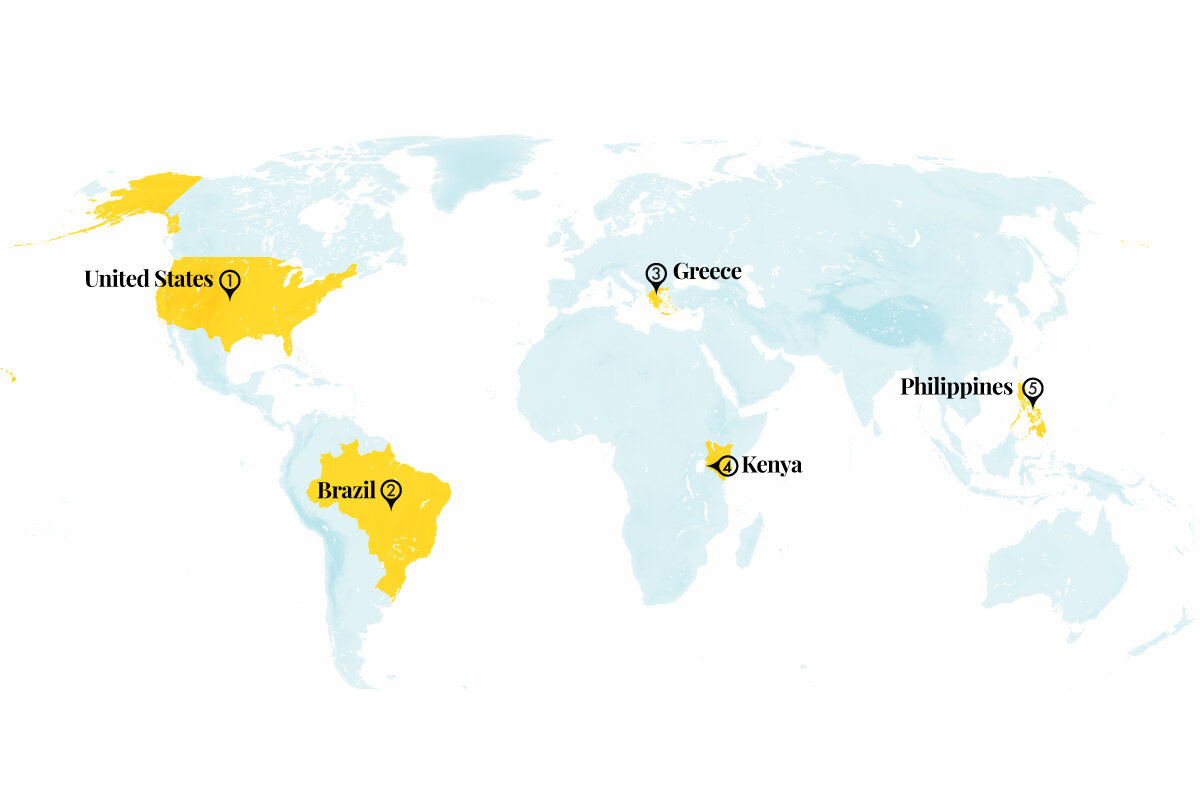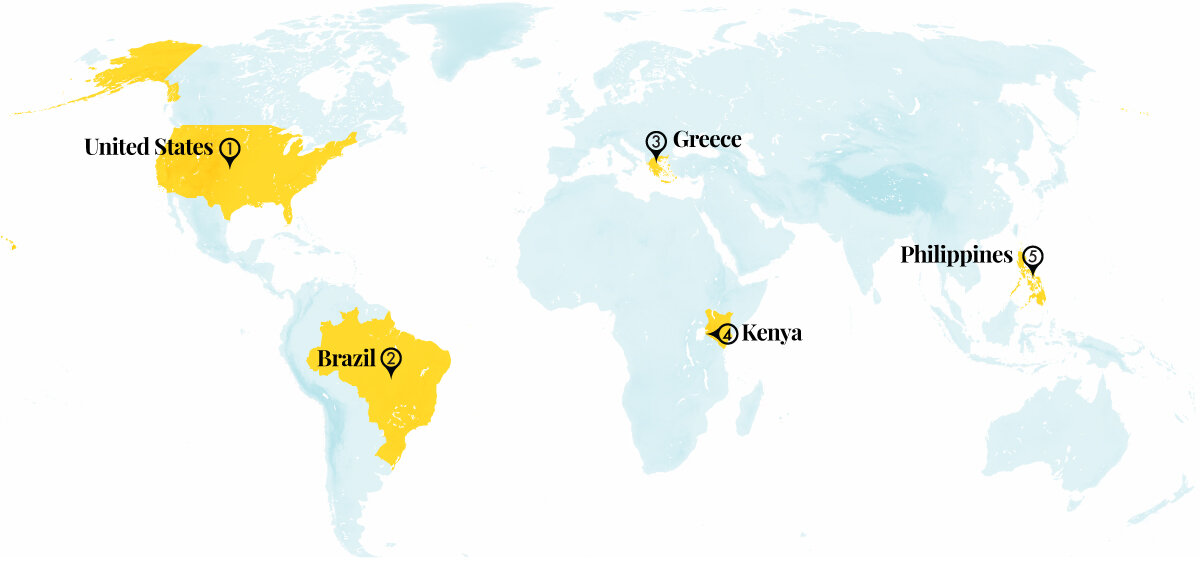Tension is common at Jerusalem’s Al-Aqsa Mosque, a space for worship that can be jolted by extremists. What’s the climate now, during Ramadan, with nearby Gaza inflamed? So far, so good. Our reporter tells why.

Why is Christian Science in our name?
Our name is about honesty. The Monitor is owned by The Christian Science Church, and we’ve always been transparent about that.
The Church publishes the Monitor because it sees good journalism as vital to progress in the world. Since 1908, we’ve aimed “to injure no man, but to bless all mankind,” as our founder, Mary Baker Eddy, put it.
Here, you’ll find award-winning journalism not driven by commercial influences – a news organization that takes seriously its mission to uplift the world by seeking solutions and finding reasons for credible hope.
Explore values journalism About usMonitor Daily Podcast
- Follow us:
- Apple Podcasts
- Spotify
- RSS Feed
- Download
Christa Case Bryant, the Monitor’s senior congressional correspondent, doesn’t bite on easy narratives – those binary ones that become red/blue fealty tests.
Days after Mike Johnson became House speaker last October, Christa joined our podcast to talk about laying out sharply different perspectives without amplifying them, instead sifting evidence of words and deeds.
“We shouldn’t be surprised that it’s hard to get it right in the first week of the first month,” Christa said then. “We as journalists will be doing that in the weeks and months to come.”
Speaker Johnson has been learning by layers, too. Today, Christa takes stock of how he’s doing. Ukraine wants aid. Washington needs funding. The stakes are high.
Already a subscriber? Log in
Help fund Monitor journalism for $11/ month
Monitor journalism changes lives because we open that too-small box that most people think they live in. We believe news can and should expand a sense of identity and possibility beyond narrow conventional expectations.
Our work isn't possible without your support.
Today’s stories
And why we wrote them
( 6 min. read )
Today’s news briefs
• New auto emissions rules: Federal standards relax initial tailpipe limits proposed last year, but eventually reach nearly the same strict standards set out by the Environmental Protection Agency.
• Apple faces antitrust suit: The tech firm says the Justice Department’s lawsuit accusing it of engineering an illegal monopoly on smartphones in the United States is “wrong on the facts and the law.”
• Reddit goes public: The initial public offering, with trading beginning March 21, will test the company’s ability to overcome a nearly 20-year history colored by losses, management turmoil, and occasional user backlashes.
• Alabama bill targets DEI: Legislation signed by Gov. Kay Ivey would ban diversity, equity, and inclusion programs at public schools, universities, and state agencies.
• South Africa confronts water crisis: Thousands of people line up for water as the country’s largest city, Johannesburg, faces an unprecedented collapse of its water system.
( 8 min. read )
The House speakership has always been a prime post of power. Now, due to Republicans’ slim majority and battles within their ranks, Speaker Mike Johnson’s job is also riding a vortex.
( 6 min. read )
In some U.S. states, changing one’s gender identity is seen as too weighty a decision for those under the age of 18. But Spain has taken a different approach, based on trusting transgender teens’ choices.
Patterns
( 4 min. read )
Hungary is a member of NATO and of the EU, but Prime Minister Viktor Orbán is closer to Vladimir Putin. Will his predictions that the West will abandon Ukraine prove true?
( 5 min. read )
Trust in the power of a college education is declining for one reason: It’s too expensive. One solution is lowering costs. But Cataldo Maria shows another way.
Points of Progress
( 5 min. read )
In our progress roundup, we focus on equality for noncitizen writers in America, speakers of native tongues in Brazil, and Maasai women in Kenya.
The Monitor's View
( 2 min. read )
When Major League Baseball opened its season this week with a two-game series in South Korea, the event turned out to be about more than promoting the sport. It was a geopolitical icebreaker between two Asian neighbors long at odds over their history.
South Korean fans welcomed Shohei Ohtani, the Japanese star player of the Los Angeles Dodgers, almost like a homegrown hero. Some called him “the perfect person.” Whatever bilateral friction still exists from Japan’s colonization of Korea was greatly melted by Mr. Ohtani’s affection for South Korea, his unmatched baseball skills, and his kindness toward Korean fans.
His reception as an exemplary hero comes soon after a similar lovefest in Japan. The Japanese have fallen hard for a hit television series called “Eye Love You” that stars a charming Korean actor, Chae Jong-hyeop. The way that his character – speaking only Korean – romances the show’s Japanese female hero has led to a rush among the Japanese to learn the Korean language and adopt Korean dating styles.
These two universals – love and baseball – have perhaps now done as much to heal ties between Japan and South Korea as years of careful diplomacy by the United States and courageous leadership by some politicians. Just five years ago, bilateral ties were so low over how to deal with Japan’s 1910-1945 occupation of the Korean Peninsula that Koreans were boycotting Japanese products. In both countries, nationalist politicians have exploited the past to the detriment of reconciliation that would allow the two democracies to work closely against threats from North Korea and China.
In recent years, polls show a rising likability between the Japanese and South Koreans, especially among young people who readily embrace the other country’s cultural exports. A majority of young Koreans under age 29 also support the efforts of the current president, Yoon Suk Yeo, to improve ties with Japan.
Earlier this month, President Yoon said that the closer ties have helped deter North Korea. “Now, South Korea and Japan are working together to overcome the painful past and moving toward a ‘new world,’” he said. “The security cooperation between the two countries against North Korea’s nuclear and missile threats has been strengthened further.” The two countries, for example, now share information on North Korea’s actions in real time.
The so-called soft power of countries, such as sports or TV shows, really does have the power of attraction. Whatever the past between nations, there’s always a chance for a whole new ballgame that brings people together.
A Christian Science Perspective
Each weekday, the Monitor includes one clearly labeled religious article offering spiritual insight on contemporary issues, including the news. The publication – in its various forms – is produced for anyone who cares about the progress of the human endeavor around the world and seeks news reported with compassion, intelligence, and an essentially constructive lens. For many, that caring has religious roots. For many, it does not. The Monitor has always embraced both audiences. The Monitor is owned by a church – The First Church of Christ, Scientist, in Boston – whose founder was concerned with both the state of the world and the quality of available news.
( 4 min. read )
We can overcome a boxed-in and dissatisfactory career trajectory by looking beyond a material perspective to the spiritual truth of our prosperity.
Viewfinder

A look ahead
Thanks for being with us today. Tomorrow, Whitney Eulich goes deep on one of the U.S. southern border’s least-told stories: For many migrants, the United States still represents the promised land. But along the way, some have found home – and success – in Mexico. Our weekly podcast will include Whitney’s thoughts on the assignment, and her full audio read.











